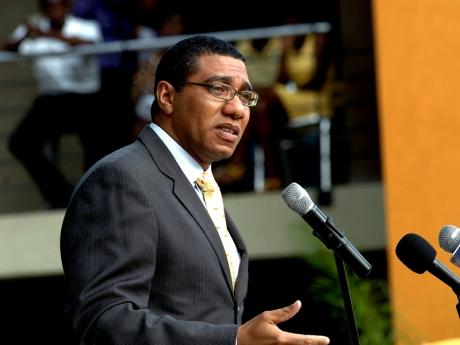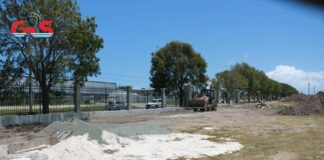
Nearly 100 judges have called on Prime Minister Andrew Holness to retract statements he made recently regarding the appointment of a Chief justice and to publicly acknowledge that the head of the judiciary is not answerable to him.
The 97 judges from the Court of Appeal, the Supreme Court and Parish Courts here said it was “necessary to publicly register our grave concern regarding some statements made by the Honourable Prime Minister, following the appointment of the Honourable Mr. Justice Bryan Sykes to act as Chief Justice of Jamaica as of February 1, 2018.”

Holness is quoted as saying that “actions that brings results will determine the assumption of the role of chief justice”.
But the judges said “by his unfortunate comments the Honourable Prime Minister, the head of the Executive branch of Government and a member of the Legislature, has sought to place the head of the judiciary, a separate and equal arm of Government, under his supervision, direction and control, and subject to a process of evaluation by him.
“This is clearly inappropriate and in breach of the fundamental doctrine of the separation of powers. We ask the Prime Minister to retract his statements and to publicly acknowledge that the Chief Justice is not answerable to him,” the judges said in their lengthy statement.
They said “our concern is heightened as this is against a background of previous statements made by other members of the executive that have crossed the line of the separation of powers and have had the effect of undermining the independence of the judiciary”.
The judges said they recognise and “deeply regret the inconvenience to litigants, attorneys and members of the public across the island caused by Monday’s meeting in Kingston” that resulted in the closure of the courts here.
“However, in light of the gravity of the concerns and in the interest of the country’s democracy and justice system, it was considered an absolute necessity. For those persons inconvenienced, we will endeavour to ensure their matters are rescheduled for the earliest possible time. Where necessary we will be sitting for extended periods to achieve this.”

The judges said that they wanted to make it clear that “we do not speak on behalf of the acting Chief Justice, and are acting independently of him and without his concurrence in indicating our disquiet.
“We make no comment in respect of the ongoing debate surrounding the question whether the acting appointment of Chief Justice Sykes is unconstitutional, illegal or otherwise invalid. That is a matter for adjudication in a properly constituted court, if it should become necessary. We do not express any views on that issue.”
But they said “it is, however, our considered view that declarations of the Prime Minister relative to the acting appointment unquestionably have serious implications for the fundamental principles of the separation of powers and the independence of the judiciary.
“These are principles of great jurisprudential value as they form the foundation of our constitutional democracy and which are critical imperatives for the protection and preservation of the Rule of Law.”
The judges said that while they welcome the focus of the Prime Minister on the administration of justice and acknowledge the concerns he raised about inefficiencies, deficiencies and delays in the justice system “we also accept and share the view that much more needs to be done to achieve timely justice outcomes”
They said that while they also accept that the judicial branch of government is independent and should remain so, “it is also accountable to the public.

“We, therefore, support any system geared towards enhancing judicial efficiency and accountability in the pursuit of timely justice outcomes. However, judicial efficiency and accountability, cannot be achieved at the expense of judicial independence and the Rule of Law.
“Any mechanism employed to achieve efficiency and accountability must be consistent with the principles of separation of powers and the independence of the judiciary. We fear, in the light of recent developments, that some have lost sight of the crucial need to ensure that the three arms of Government function together in a way that is complementary of each other and consistent with the spirit of the Constitution and the intention of its framers.”
In their statement, the judges said that it should be clearly recognised that the safeguards of separation of powers and independence of the judiciary are not intended for the benefit of the judges who are the office holders.
“Rather they are intended for the benefit and protection of Jamaican citizens and all others who come within our jurisdiction. For that reason, judges must be free to enforce the laws of the land, “without fear or favour, affection or ill-will”, which they are sworn to do.
“For the judiciary to adequately and appropriately perform its constitutional functions and maintain its authority and legitimacy, judicial independence must be zealously safeguarded and preserved.”
They said with regards to judicial accountability, they are urging “that the nature and scope of judicial accountability to the populace we are sworn to serve, should operate in a manner that faithfully preserves the independence of the Judiciary and the separation of powers.
“The vital importance of these fundamental principles was clearly established in the seminal decision of the Judicial Committee of the Privy Council in Hinds v the Queen [1977] 1 A.C. 195. There is no room within our constitutional framework for one arm of government to impinge on the authority of another.”
The judges said that they recognise the desirability of the continued modernisation of the judicial system including possible changes in the way judges are assigned, continued focus on efficient criminal and civil case management, the allowance for scheduled time to write judgments, and the increasing use of technology to enhance efficiency.
“It must however be recognised that while we all have to operate within the constraints of Jamaica’s tight fiscal space, without substantially increased inputs into the justice system, in terms of the physical stock of courtrooms, additional human resources at all levels and the provision of the necessary tools utilised within the system, the desirable levels of improvement cannot be achieved or sustained.
“This in a context where inadequate investments in the justice sector has been a feature of successive Governments since independence.
Advertise with the mоѕt vіѕіtеd nеwѕ ѕіtе іn Antigua!
We offer fully customizable and flexible digital marketing packages.
Contact us at [email protected]
















